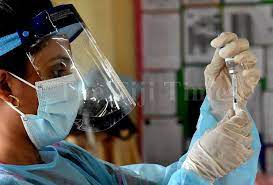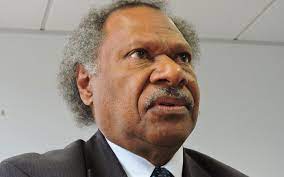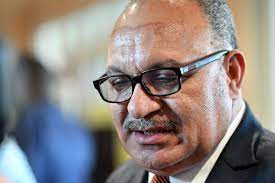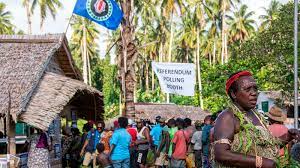PACNEWS
Pacific News Agency Service –administered by the Pacific Islands News Association (PINA)
| First Edition | Monday 21 June 2021 | © Copyright PINA 2021 |
In the bulletin:
- FIJI — ‘No jab against will’ : Fiji Employers can make vaccination mandatory for certain work – Apted
- FIJI — COVID-19 claims another life; 115 new cases reported in Fiji
- FIJI — Controversial legal case in Vanuatu nearly complete
- FIJI — PNG cabinet told $1.2b UBS loan was illegal
- PACNEWS BIZ — Selling Cook Islands to Kiwis
- PACNEWS IN FOCUS — Fijian Media Association agrees way forward
- PACNEWS SPECIAL REPORT — Bougainville independence: Pressure for PNG agreement builds

Well-known Suva employment lawyer Jon Apted says under Fiji’s 2013 Constitution, no person can be vaccinated against their will without a court order.
However, he says, in the workplace, an individual’s right not to be vaccinated has to be balanced against the rights of others.
“The Constitution gives everyone other rights such as the right to life, the right to health, as well as to fair labour practices,” Apted said in response to queries from Fiji Times
“Employers have legal obligations to protect those rights as well, and to provide their workers and others who come to the workplace with a safe place of work and a safe system of work.”
Apted said that in his view, vaccination could not be simply “made compulsory across the country”. Nor could “just make it a blanket rule for all their workers”.
“Employers can make it mandatory that certain kinds of work that involve a risk of transmitting COVID to others can only be done by vaccinated workers,” he said.
“However, they can only do this if it is a reasonable requirement for that work, based on proper information about the risks with and without vaccination and if there is no other alternative way of protecting the others.”
Apted said that employers “need to be able to justify the requirement as a ‘genuine occupational qualification’ or have some other ‘genuine justification’ for the requirement”.
For example, he said, those employed in care-giving in aged-care facilities, frontline workers for airlines and those who worked at the border and hospitals might be required to get vaccinated.
He said employers must always try to accommodate an employee’s wish not to be vaccinated, as long as the worker does not pose any risk to anyone in the work premises.
Apted said the Government and human rights bodies could provide information to help employers and workers make decisions related to vaccination.
They could do this, he said, by issuing “simple, easily understood guidelines and official scientific information that employers can use to make their decisions”.
“We have to remember that when we talk about employers, we are not just talking about big businesses. We are talking about everyone who employs someone else.
“This would include those of us who employ domestic help.
“Many people are voluntarily getting vaccinated so the issue will arise only for those who decline.
“I stress though that the employer must always do its best to accommodate anyone who objects to vaccination, if the employer reasonably can.
“However, of course, new legal issues like this one may ultimately have to be decided by the courts,” he said.
SOURCE: FIJI TIMES/PACNEWS
Fiji has reported 115 new cases of COVID-19 and one death Friday.
Ministry of Health and Medical Services permanent secretary Dr James Fong said the majority of these cases are related to existing clusters of transmission or to localities where significant transmission has occurred.
“These localities are well known areas of concern that we have discussed in our updates throughout the current outbreak,” he said.
Dr Fong said 52 cases are from the known clusters:
Nasinu Police Barracks: 6,Navosai: 2,CWMH: 8,Nawajikuma, Nadi: 7,Townhouse hotel: 7,Freshet: 13,Rewa EOC: 1,12 are from new clusters: Max Value Supermarket, Lami (8) and Public Rental Board (4)
He said seven cases have also been detected during screening at the Valelevu, Nuffield, and Raiwaqa screening clinics. 1 case was also identified during screening at Nadi hospital. Investigations are underway to determine any links to known cases.
“21 have been identified as primary contacts of previous cases and are under investigation by the contact tracing teams to determine if there is a cluster link.
“22 cases are from the following areas and are under investigation to determine if they have links to other cases. They are currently considered cases of community transmission: Naqio settlement, Rewa (2), Nadave (1), Nausori village (7), Naulu (4), Omkar Rd, Narere (1), Valenicina, Lami (1), Verata, Nausori (1), Milverton Road, Raiwaqa (1), Qauia, Lami (2), Naduru Rd, Nausori (1), and Fiji Pharmaceutical and Biomedical Services (1)
“We unfortunately have recorded another death at CWM Hospital. This is a 49-year-old man who had been admitted for almost a month and was being treated for a severe non-COVID pre-existing condition. He tested positive for COVID-19 during his admission, and his doctors are currently investigating to determine if this is a COVID-19 death.
“There are now 1182 active cases in isolation. There have been 1578 cases during this outbreak that started in April 2021.
“We have recorded a total of 1648 cases in Fiji since the first case was reported in March 2020. There have been 452 recoveries and 6 deaths due to COVID-19. A total of 7 COVID-19 positive patients have died from pre-existing non-COVID-19 related illnesses. 1 new death is currently under investigation,” said Dr Fong.
Meanwhile, two doses of the AstraZeneca vaccine have a 92 per cent success rate at preventing hospitalisation from the delta variant of the COVID-19 virus.
Dr Fong said these findings were revealed in a recent study by Public Health England and he urged Fijians to come forward and take the jab.
“My teams are committed to continue vaccinating our population and protecting Fijians from this deadly disease,” he said while announcing the 121 new cases of COVID-19 recorded on Wednesday.
“So, we ask those who have received one dose to make sure they receive dose number two and we encourage every eligible Fijian awaiting their first dose to seize this opportunity to protect themselves.”
Dr Fong said an additional 70,000 doses of COVID-19 vaccines would arrive from Australia next week, which would amount to 250,000 doses contributed so far of the one million pledged to Fiji.
“We’re grateful that the commitment to deliver 40,000 vaccines per month has been exceeded.
“Australia’s commitment, as well as that of New Zealand, has helped us reserve the full dosage of COVID-19 vaccines for every eligible Fijian.
“We are also grateful to the Indian Government for their initial contribution of 100,000 COVID-19 vaccines,” he said.
SOURCE: PACNEWS/FIJI TIMES

here have been astounding developments in a controversial legal case in Vanuatu.
The case revolves around the move by the then speaker, Gracia Shadrack, to deem the seats of 19 government MPs vacant after they had been absent from parliament on three consecutive days.
Stephanie Mahuk and Nigel Morrison, the lawyers for the Speaker’s Office, had been acting for Mr Shadrack in the case, but earlier this week he surprisingly resigned from the speaker role, and the government replaced him with Seule Simeon.
Simeon’s office then sought to end the legal case and efforts were made to have all the parties sign a consent form, but Mahuk andr Morrison, refused.
The consent would have ended the trial, left the MPs in place and created precedent precluding the Speaker from ruling on important parliamentary matters.
When Justice Saksak learned of what happened he accused the MPs’ lawyer Robert Sugden of coming within a hair’s breadth of attempting to pervert the course of justice, and refused to allow Morrison and Mahuk to cease to act.
Justice Saksak is now expected to rule on the vacationing of the seats later today.
Radio New Zealand Pacific correspondent has reported if the 19 MPs lose their seats the remaining 13 government MPs may resign to force a new election.
SOURCE: RNZ PACIFIC/PACNEWS

A $1.2 billion(US$810 million) loan extended by the Sydney office of UBS to Papua New Guinea in 2014 bypassed the usual cabinet and parliamentary procedures and was opposed by at least four senior ministers, a royal commission into the costly deal heard Thursday.
In his opening day of evidence, former PNG prime minister Peter O’Neill, who championed the deal, told the inquiry he regarded the transaction as “urgent” and said it was not feasible to put all such “loans and borrowings” through Parliament.
Counsel assisting the inquiry, James Renwick, SC, questioned this answer and noted: “But O’Neill it was a very substantial amount of money.“
The inquiry heard outside legal advice was sought to validate the decision not to seek parliamentary approval.
“Is that best practice to seek external legal advice rather than rely on the advice of the state solicitor or the attorney-general?” Dr Renwick asked.
O’Neill said external advice was sought from time to time.
It is understood that legal advice was given by Norton Rose Fulbright, which has refused to hand over documents to the inquiry, despite the files belonging to a PNG government-owned entity that has given its consent.
A determination of whether the loan required parliamentary approval and therefore complied with Section 209 of the PNG constitution will be one focus of the inquiry. If the loan is deemed not have been properly arranged, UBS could face legal action or sanctions for what could be deemed an illegal transaction.
UBS has refused to co-operate with the inquiry and only acknowledged it had received a request for documents on Wednesday evening, despite the first correspondence being sent on 19 May.
Under the deal, PNG borrowed $1.2 billion from UBS to buy a 10 per cent stake in ASX-listed Oil Search. The highly speculative transaction went bad when Oil Search shares fell sharply in late 2014 and PNG was forced to sell out. The Pacific nation is thought to have lost $400 million(US$302 million) on the deal, while UBS is believed to have made more than $100 million(US$75 million).
O’Neill denied twice during his evidence ever having spoken to or met with UBS’ former head of investment banking, Guy Fowler. This was despite the inquiry being shown an affidavit from a senior public servant stating Fowler asked for O’Neill’s help on an associated transaction.
Fowler is the executive chairman of newly formed investment bank Barrenjoey Capital Partners. He has so far refused to co-operate with the inquiry.
The inquiry heard that the then treasurer, state enterprise minister, petroleum minister and attorney-general had all raised objections to the deal and insisted it required parliamentary approval.
They all said they only saw the highly complex cabinet submission on the day cabinet was asked to approve the deal and that it had not been considered by the relevant subcommittee.
“In short that NEC [cabinet] meeting was bulldozed through by prime minister O’Neill without any regard for due diligence,” said Ben Micah the former minister for public enterprises and state investment.
O’Neill will give further evidence in July.
SOURCE: AUSTRALIA FINANCIAL REVIEW/PACNEWS
PACNEWS BIZ
More than 40 Cook Islands tourism operators have signed up to display their products at a trade expo in Auckland next month.
The idea was tabled early this month when Cook Islands Tourism Australasia general manager Graeme West called for feedback at a global breakfast update hosted by the Cook Islands Tourism Corporation, at the Edgewater Resort and Spa.
On Wednesday, West confirmed more than 40 exhibitors would attend, including Air New Zealand.
A venue in Ellerslie had been initially proposed but the overwhelming response had forced organisers to look elsewhere, he said.
“We have had an overwhelming response from hoteliers and operators joining us for the expo,” West said. “In fact, so many have registered we have had to look for a new venue.”
West confirmed later on Wednesday that the venue had been moved to the Hilton Auckland.
Operators will have their own booths with a trestle table at no cost but it would be their responsibility to dress it.
The expo will have two components – on Sunday, 04 July, a consumer day aimed at attracted visitors and Monday, July 5, will focus on retail travel agents and wholesalers, West said.
“It gives people the opportunity to walk around and speak with all of the hotels, resorts and activity operators.
“It will show the breadth of accommodation we can offer and the number of excellent activities and attractions available for people to enjoy.”
There would also be Cook Islands destination presentations during the expo, West added.
“Consumers can make bookings on the day, either directly with the hotels and resorts, or through one of the retail agencies we have attending.”
Cook Islands Tourism Industry Council president Liana Scott, who will be attending the expo, said there had been a good response from operators, given the short notice.
“When you normally go to expos you are competing with other nations. This expo will be solely Cook Islands focussed,” said Scott, who is the general manager of the Muri Beach Club Hotel.
“It has been 14 months, people have been out of touch. I think we need to make sure we are sending the messages that give confidence to travellers.”
Early this month West estimated visitor numbers to the Cook Islands to be between 50 and 60 per cent of pre Covid-19 figures in the coming months, with 11,000 estimated in July, 9000 in August, 10,000 in September and 10,500 in October.
SOURCE: COOK ISLANDS NEWS/PACNEWS
PACNEWS In Focus
The views expressed in PACNEWS are those of agencies contributing articles and do not necessarily those of PINA and/or PACNEWS
The Fijian Media Association (FMA) convened a virtual special general meeting on Thursday, 17 June 2021 to present audited accounts, discuss training opportunities, and agree on a way forward for the association during this global Covid-19 pandemic.
Some 50 members of the association joined the virtual session where the FMA executives presented audited financial accounts for 2014 to 2020. Members endorsed the financial reports and the plans for the months ahead.
The FMA discussed the support of the Australian Department of Foreign Affairs and Trade (DFAT) through the Pacific Media Assistance Scheme (PACMAS) for a range of training programmes for Fijian and regional journalists that include budget reporting and digital journalism. A training of trainers programme is also planned which will certify senior journalists to train their media colleagues locally.
The FMA is also exploring with DFAT through the Australian High Commission ways to support Fijian media workers through further capacity building and other initiatives that include the continuation of the press club events and revival of the Fiji media awards.
FMA General Secretary Stanley Simpson thanked Australia for its support of a part-time coordinator to help the association meet its objectives.
“It has not been easy as full-time journalists but we are acutely aware of our obligations toward the administration and governance of the association so we are grateful that we have support in this area,” said Simpson.
Simpson and other senior FMA editors Indra Singh, Dreu Vukeilagi, Reginald Chandar, Makereta Komai, Samisoni Pareti and Rosi Doviverata thanked their Fijian media colleagues for their dedication in keeping the public informed about the Covid-19 pandemic.
The journalists were encouraged to keep to their calling and not become disheartened during these extraordinary and challenging times.
The association is working towards establishing a secretariat with a full-time coordinator.
The next annual general meeting of the FMA is due to be held in February 2022.
FMA membership includes individuals from the Fijian Broadcasting Corporation, Fiji Live, Fiji Sun, Fiji Times, Fiji TV, Islands Business , MaiT V and Pacific Islands News Association (PINA), with communications specialists as associate members.
SOURCE: FMA/PACNEWS
SPECIAL REPORT

Setting goals for independence by 2025, UN membership and a sustainable economy signal Bougainville’s resolve
By Anthony Regan
The second constitutionally mandated post-referendum consultations between Papua New Guinea and Bougainville leaders about independence for Bougainville are being planned for late June 2021. Bougainville President Ishmael Toroama stated a goal of independence and full United Nations membership by the end of 2025 at the first consultation meeting, chaired by the UN, on 18–19 May. Together with significant initiatives taken by the Autonomous Bougainville Government (ABG) since elections last year, the statement of these goals signals a degree of commitment to independence that not so far fully understood outside Bougainville.
The PNG/ABG consultations are required following the referendum on Bougainville independence held late in 2019. There was a 97.7 per cent vote for independence, based on an 87 per cent turnout of enrolled voters, in turn based on a remarkably accurate roll. The referendum was adjudged “credible, free and fair” and “transparent and inclusive” by multiple independent international and national observers.
Unlike other conflicts resolved by agreements requiring a referendum on independence following a period of autonomy (notably Southern Sudan and New Caledonia), the Bougainville referendum outcome is not binding on PNG. Rather the Bougainville Peace Agreement and the PNG constitution leave the referendum outcome to be dealt with by three possible processes: first, PNG and ABG consultation; second, subject to consultation outcomes, tabling of the referendum results in the PNG Parliament for “ratification”, involving “final decision-making authority” of the parliament; third any “differences” being resolved per the “dispute resolution procedure” provided for in the PNG Constitution.
The first consultation was held almost 18 months after the referendum, much to the frustration of many Bougainvilleans. Reasons for delay in the first half of 2020 included ABG constitutional amendment processes and a PNG Supreme Court challenge (both unsuccessful) directed to giving then sitting ABG president John Momis a third term in office. Subsequently Covid-19, ABG general elections, and a late-2020 PNG political crisis were factors. But in addition, there was a lack of PNG focus and preparedness.
During the two day consultation, ABG President, Ishmael Toroama tabled a short “timeline” of main steps towards achieving independence in 2025. It included the end of 2022 for achieving not only transfer of all powers as yet to be transferred to the ABG from PNG under the autonomy arrangements, but also for achieving “self-government” for Bougainville. Self-government would involve establishing a “constituent assembly”, which by the end of 2024 would present “feedback on the draft Independent Bougainville Constitution”. The timeline steps were intended to set the agenda for the second consultation meeting.
PNG’s Prime Minister James Marape did not reject Bougainville’s independence demand outright. He expressed concerns, however, both that Bougainville independence could provide a precedent for other parts of PNG to secede, leading to the dissolution of PNG and about Bougainville’s capacity to manage independence.
All Bougainville public service departments are being challenged to become independence-ready.
Perhaps the most significant initiative illustrating the extent and depth of commitment to the goal of early independence is the ABG’s multi-faceted “independence-ready” program. Launched by a late 2020 resolution of the ABG House of Representatives, the program was inspired by the highly successful 2016 to 2019 ABG constituency-based “referendum-ready” program, which made significant contributions to local-level referendum-awareness. The independence-ready program has a similar constituency-based focus, involving locally focused independence awareness and encouragement of behaviour change in all 33 single member ABG constituencies, as well as the three “regional” constituencies, each represented by one woman and one “former combatant” and has so far been launched in 23 of the single member constituencies.
A major independence awareness focus involves the related issues of economic development and generating the sustainable Bougainville government revenue needed to support independence. The ABG accepts the conclusions of research undertaken for the PNG National Research Institute since 2018 by economist, Satish Chand, and others, indicating that an independent Bougainville is likely to need a budget two to three times the current ABG budget. The 2020 ABG budget was about K440 million (K151 million recurrent and K242 million capital expenditure). “Internal” revenue sources in 2020 (some under PNG control but nevertheless derived locally, such as goods and service tax and tuna licence revenues) were estimated at K30 million, about 16 per cent of the total budget.
The independence-ready program responds to the internal revenue deficit through awareness efforts encouraging all Bougainvilleans, including resource owners, to engage in income-earning activities (wage employment, cash crop production, or establishing businesses) with a view to contributing to economic growth, and also encouraging people to be tax payers, contributing to the proposed independent government’s revenue base.
Bougainville is also exploring what it should receive from PNG’s current share of revenue from a regionally administered Pacific tuna fishing licence scheme for fishing in Bougainville-associated waters, which Chand estimates “could range from K30 million to K130 million per year”. The President also talks of proposed new ABG supported business ventures, part funded by the ABG (US$19 million) and investors (US$100 million), creating 2,000 new jobs.
All Bougainville public service departments are being challenged to become independence-ready by moving promptly to develop ABG legislation to transfer as yet untransferred powers available to the ABG under the autonomy arrangements. The constitutional transfer process has been simplified by the ABG-initiated Sharp Agreement signed by both governments a few days before the first consultation meeting. The ABG sees this simplified transfer process as contributing to the independence-ready process.
Finally, recognising the difficulties likely to be involved in gaining international community recognition as a new state and gain UN membership, the ABG cabinet has recently established a Ministerial Committee on International Relations that will be “cultivating international support” for Bougainville independence.
The aim of highlighting here important aspects of the ABG’s commitment to and plans for achieving independence is not to raise questions about how realistic they are being, but rather to indicate the depth of commitment evident in the ABG position and its related post-referendum initiatives. It is clearly going to be difficult for PNG to persuade the Bougainville leaders to accept anything short of full independence. Neighbouring countries need to be aware of the direction that the consultations are taking, and the difficulties likely to arise in reaching compromises in the initial consultation process, and perhaps beyond….PACNEWS
SOURCE: LOWY INSTITUTE/PACNEWS

